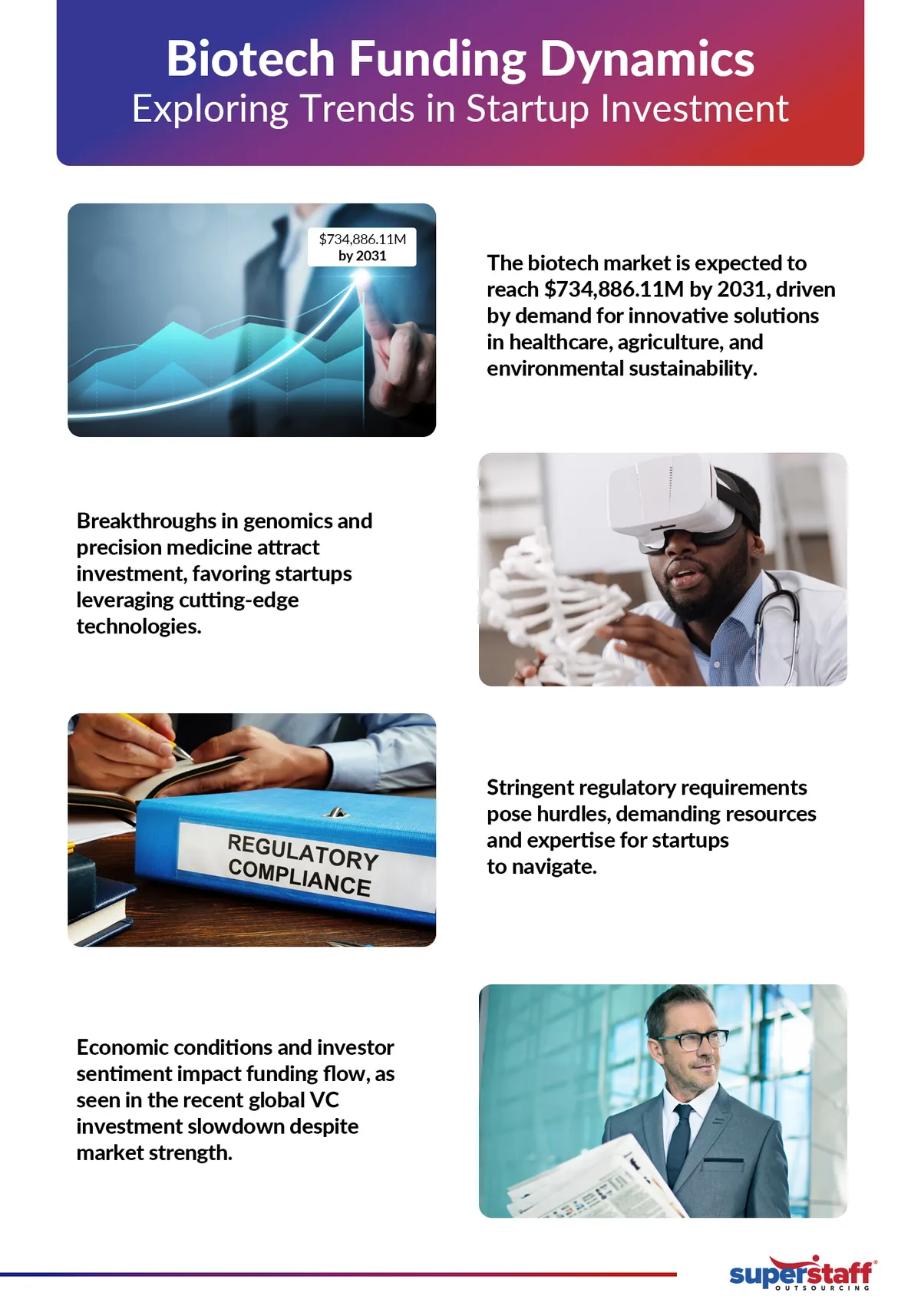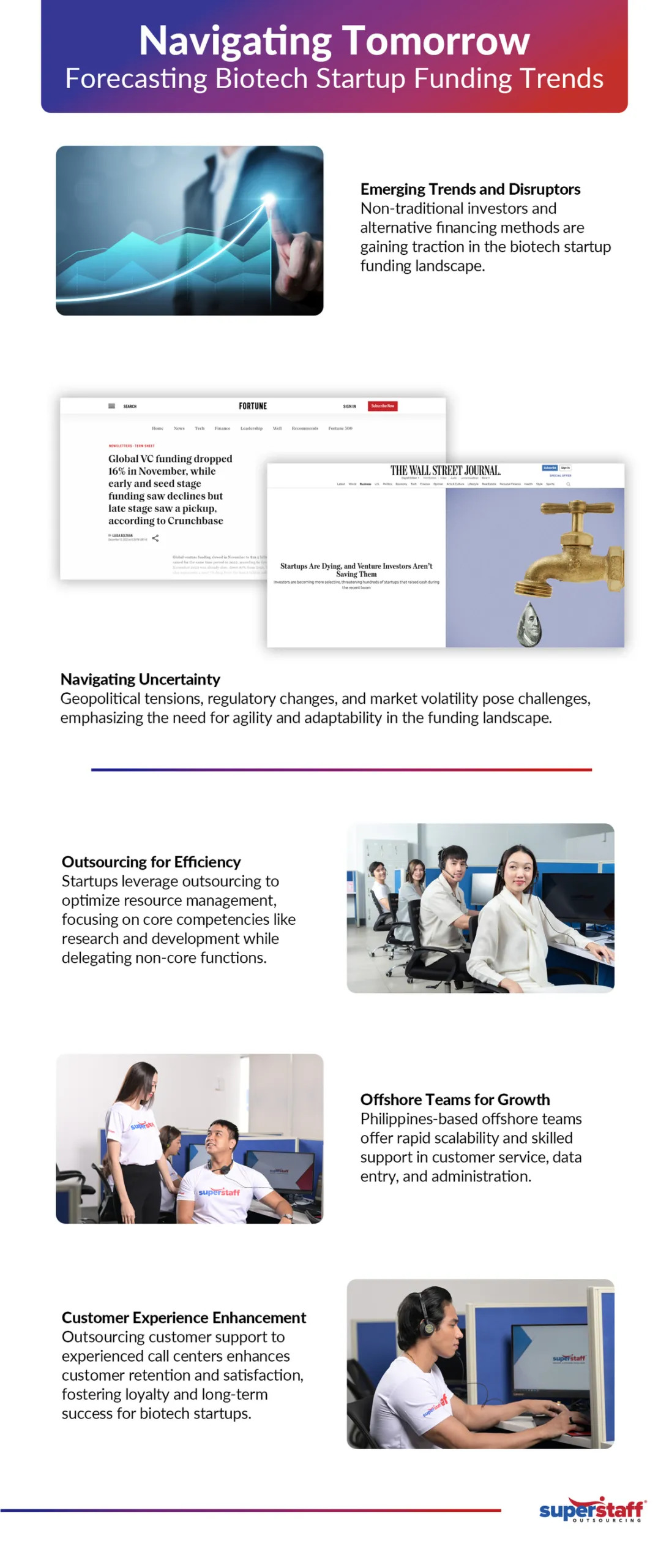
Despite challenges, biotech startups demonstrate resilience and innovation, heavily reliant on funding to conduct research, navigate regulations, and bring therapies to market. Competition intensifies with collaborative platforms emerging. However, securing funds remains critical for preclinical trials, talent acquisition, and technology adoption, ensuring promising ideas reach patients effectively.
The Most Common Types of Biotech Startups Funding
Venture Capital Funding
Venture capital funding in biotech shifted towards later-stage companies in 2023, with a decline in early-stage investments. Nevertheless, venture capitalists are vital in supporting biotech startups, enabling research, product development, and scalability. Their backing remains essential for navigating the competitive landscape and driving innovation in personalized medicine and gene therapy.
A disadvantage of venture capital funding is the potential loss of autonomy for founders, as investors often require a significant stake in the company and may influence decision-making processes.
Angel Investors and Seed Funding
Angel investors and seed funding play vital roles in early-stage biotech ventures, offering crucial capital and mentorship. Angels, high-net-worth individuals, invest their money in smaller rounds, backing founders and ideas. Seed funding, often coming from angels, kickstarts startups. Both support product development, research, and team building, paving the way for future growth.
The primary drawback of securing funding via angel investment is relinquishing ownership and control, as founders might surrender anywhere from 10% to 50% of their company shares.
Government Grants and Funding Programs
Governments often allocate funding through grants and funding programs to support biotech startup research and development efforts. These initiatives are typically awarded based on the scientific merit of proposed projects, focusing on advancing scientific knowledge and addressing critical societal needs.
A drawback of government grants and funding programs is the often stringent application process and bureaucratic hurdles, which can delay funding disbursement and hinder agility in project execution.
Corporate Partnerships and Collaborations
While big pharma organizations offer substantial resources and extensive experience in commercialization, smaller biotech firms bring technical innovation and specialized expertise to the table. This symbiotic relationship, rooted in leveraging each other’s strengths, forms the foundation of well-structured partnerships that thrive in the competitive biopharma landscape.
A disadvantage of startup funding from corporate partnerships is the risk of losing independence and control over strategic decisions.
The Latest and the Greatest: Biotech Startups Funding Trends

For biotech startups, securing adequate funding is not just a matter of survival; it’s a prerequisite for success in an industry marked by high stakes and fierce competition.
Let’s explore four key factors influencing funding trends in the biotech sector, shedding light on the opportunities and challenges ahead.
Market Demand for Biotech Innovations: Fueling Investment
The global biotechnology market continues its upward trajectory, with a projected value of $734,886.11 million by 2031 — a significant increase from its 2024 value of $331,213.73 million. Its 14.21% CAGR (compound annual growth rate) reflects the sector’s robust expansion and increasing importance in addressing global challenges.
The rising demand for innovative solutions across various sectors, including healthcare, agriculture, and environmental sustainability, ultimately drives this significant growth.
As societies worldwide grapple with pressing issues such as escalating healthcare costs, food security concerns, and environmental degradation, there is a growing need for biotech innovations to provide effective solutions. Investors closely monitor these market trends and are eager to allocate capital to startups that demonstrate the potential to address these challenges with novel technologies and therapies.
Technological Advancements Driving Investment Opportunities: Paving the Way for Innovation
Breakthroughs in genomics, synthetic biology, and precision medicine have opened up new avenues for innovation, attracting investment from venture capitalists, corporate investors, and government funding agencies.
Startups that leverage cutting-edge technologies to develop disruptive solutions are well-positioned to attract funding and drive significant impact in their fields.
Regulatory Environment and Approval Processes: Navigating Challenges
The path from research and development to commercialization is fraught with regulatory hurdles, including clinical trial requirements, safety and efficacy assessments, and approval processes from regulatory agencies such as the FDA and EMA.
Navigating these challenges requires substantial resources and expertise, making regulatory considerations a critical factor in funding decisions for biotech startups.
Economic Conditions and Investor Sentiment: Shaping Investment Climate
Economic factors such as interest rates, inflation, and geopolitical uncertainties can significantly impact the flow of capital into biotech startups. Furthermore, shifts in investor sentiment towards specific subsectors or technologies contribute to fluctuations in funding trends. Take the recent global VC investment slowdown despite the market’s overall strength.
There has been a noticeable decline in deal-making activity and funding amounts in recent quarters. In the first quarter of 2022, global VC investment reached a robust $144 billion — a decrease from the previous quarter’s record high. This trend persisted into 2023, with deals experiencing a sharp decline in the first quarter.

Predictions for Continued Growth in Investment Activity: Fueling Innovation
The global health crisis has fueled a new-age biotech boom.
Increasingly, more investors are now recognizing the potential for high returns. As technological advancements drive new opportunities for innovation, we expect to see a surge in venture capital investments, angel funding, and strategic partnerships.
Emerging Trends and Potential Disruptors in the Biotech Funding Landscape: Navigating Uncertainty
While the outlook for biotech startup funding is optimistic, emerging trends and potential disruptors pose challenges and uncertainties for startups and investors alike. One such trend is the rise of non-traditional investors, including sovereign wealth funds and corporate venture capital arms, who are increasingly allocating capital to biotech startups.
Additionally, the growing popularity of alternative financing mechanisms such as tokenization and crowdfunding presents new fundraising opportunities but also introduces regulatory complexities and investor protection concerns.
Geopolitical tensions, regulatory changes, and market volatility also have the potential to disrupt investment activity and reshape the funding landscape, underscoring the importance of agility and adaptability in navigating uncertainty.
Outsourcing: Optimizing Resource Management and Accelerating Growth
As these startups strive to navigate the complexities of the funding landscape and accelerate their growth trajectories, outsourcing has emerged as a powerful tool for optimizing operations and enhancing efficiency.
Navigating Biotech Startup Funding Trends
One of biotech startups’ most significant challenges is raising the necessary funding to support their research and development efforts. Traditional funding sources are often limited, so startups must explore alternative avenues to secure the required capital. This is where outsourcing comes in.
Delegating non-core functions such as customer support, tech support, and back office support empowers startups to focus on their core competencies: scientific research and product development. Ultimately, outsourcing gives them the leverage to keep pace with evolving trends in this hypercompetitive market.
Maximizing Efficiency with Offshore Teams
Offshore teams have become increasingly popular among biotech startups seeking to optimize resource management and drive growth.
By leveraging offshore teams for tasks such as customer support, data entry, and administrative work, startups can scale their operations rapidly without significant upfront investment in infrastructure and overhead costs. This flexibility is particularly beneficial for startups in the life sciences industry, where agility and responsiveness drive success.
Outsourcing to the Philippines: A Strategic Move
Over the past few decades, the Philippines has emerged as a prime outsourcing destination, earning the title “Call Center Capital of the World.”
With a large pool of talent, a favorable business environment, and competitive labor costs, this Southeast Asian nation offers biotech startups a compelling opportunity to access high-quality outsourcing services at a fraction of the cost compared to Western countries.
It offers a skilled workforce with expertise in customer service, technical support, and other essential functions, ensuring seamless operations and superior customer experiences.
Enhancing Customer Retention and Experience
Customer experience is a critical differentiator to make or break a startup’s success.
Fortunately, delegating customer support functions to experienced call center outsourcing services in the country allows startups to provide round-the-clock support for increased customer satisfaction.
With the help of well-trained English proficient agents skilled in customer care, startups can deliver exceptional service and build lasting relationships with their customers, driving loyalty and long-term success.
Unlock Accelerated Growth for Biotech Startups
As biotech startups navigate funding constraints and operational efficiency challenges, outsourcing will continue to drive growth and innovation.
At SuperStaff, we understand the unique challenges that biotech startups face in today’s competitive landscape. That’s why we offer tailored outsourcing solutions to streamline operations and drive growth for your venture.
With our expertise in call center services, technical support, and administrative tasks, we provide biotech startups with the specialized resources they need to focus on their core competencies: scientific research and product development.
Whether you require round-the-clock customer support, data entry services, or administrative assistance, SuperStaff supports your growth journey. Our strategic outsourcing solutions allow biotech startups to optimize resource management, drive innovation, and achieve long-term success in the dynamic biotech industry.
Experience the difference with SuperStaff and elevate your startup to new heights today.






